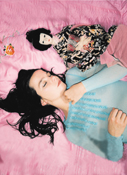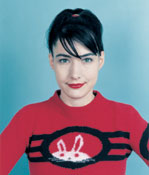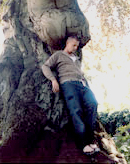 |
  |
 |
  |
 |
 |
| |

Read Bjork's2001 interview with Juergen Teller from the index archives. |

|
 |

Kathleen Hanna discusses writing and making music in this interview from 2000 with Laurie Weeks. |
|
 |
|
 |
|
|
 |

Isabella Rossellini spoke with Peter Halley in this 1999 interview. |
|
 |
|
|
 |
 |
|
Alexander McQueen's 2003 interview with Bjork. |
|
 |
|
|
 |
|

|
| John Peel, 2003
WITH STEVE LAFRENIERE
PHOTOGRAPHED BY ANDERS EDSTROM |

India Mahdavi, interior designer, creates places one longs to be, for a moment or for a week. From the irresistible lightness of Miami's Townhouse hotel to the privileged nocturnal luxury of the New York nightclub APT, Mahdavi's designs exude a sense of well being. Sydney Picasso caught up with India in her office and showroom in Paris's seventh arrondissement.
STEVE: You're the hardest-working man in showbiz. At least in Britain.
JOHN: I sometimes feel like that, yes, but it's not real work like shipbuilding or anything. At the moment I'm listening to records for my show.
STEVE: You must get loads.
JOHN: I once worked it out that I'd get through all the records I receive in one week if I listened day and night for three weeks.
STEVE: Some of your shows are done from home, and some from the BBC in London?
JOHN: Yes, and my house is becoming virtually uninhabitable, I've got so many boxes of unheard records. My daughter had a horse for a while. It died a rather ghastly death about five years ago. But the poor creature wasn't even cold before I was putting shelves up in its stable to create a singles shed. Unfortunately it's in a field on the other side of the road. So if I'm in the middle of the program and I want a song, I have to put on a long record, get a torch, and run across the road.
STEVE: I listen to the show as a webcast. Have you gotten a sense of the audience becoming more global since that began?
JOHN: Oh yes. And as a result, we have friends all over the world. There are people who come and stay with us - and people with whom we go and stay - that we've encountered through the program.
STEVE: Your show has the highest percentage of listeners under sixteen in the UK. Do you see yourself representing bright geeky teens everywhere, John?
JOHN: To be honest, I see myself representing the kind of bloke who goes round record fairs or stands at the back at gigs feeling a bit too old and slightly uncomfortable.
STEVE: Maybe that's what makes your playlist so interesting. One minute I'm hearing Teen Cthulhu or Mieskuoro Huutajat and the next Doris Day. Do you ever get grief from the higher-ups at Radio One?
JOHN: Nobody in management has ever attempted to interfere with the music policy of the program. There was one idiot who, when I started playing hip-hop, took me aside and earnestly told me that I shouldn't be playing this because it was the music of black criminals. I mean, it just redoubles your enthusiasm.
STEVE: You know, I was aware of your name years before I knew exactly what you did. The first time I heard your voice you were reading a children's story on an old T-Rex album.
JOHN: [laughs] Ah, that was a strange relationship. For three or four years Marc Bolan and I were kind of best friends, along with his wife June and my wife Sheila. We used to go off and do hippie things at weekends - Stonehenge or Glastonbury Tor. And I used to get Rex loads of gigs. I'd get booked in somewhere as a DJ, and I'd ask, "Can I bring this band with me?" We spent a lot of time together.
STEVE: Wasn't there a falling-out at some point?
JOHN: Well, when Marc saw the doors he'd been banging on for so long suddenly start to open, he did go a bit mad. It was one of those things where I phoned up to see what we'd be doing next weekend, and somebody answered the phone and said, "Look, Marc's very busy. Can he call you back?" And then he never did. You feel mildly offended, but life's too short.
STEVE: Does that happen much? You've launched so many people who went on to astronomical fame.
JOHN: It's actually quite funny sometimes.
With David Bowie there was a stage after Space Oddity when the follow-up records didn't go so well. He finally ended up on a Tyrannosaurus Rex tour himself, opening at the bottom of the bill before an Australian sitar player which, I believe, is about as low as you can get. He was doing his mime act at the time - man locked in a phone box, that sort of thing. Awful
theaters. 8:30 would roll around, "David, you're on!" [laughs] And then the next time I saw him he was at a reception being escorted by a group of huge black karate experts. I thought, "Hold on, I'll have a word with David." I started to move toward him, but one of them stepped in front of me and yelled, "Hey, asshole!"
STEVE: Amazing.
JOHN: Well, it seems to be part of the process. But it's sad when it happens to people you really do love.
STEVE: Is John Peel your given name?
JOHN: John Ravenscroft.
STEVE: I've always thought maybe you named yourself after Mrs. Peel on The Avengers.
JOHN: Ah, nothing to do with her. When I went to Radio London they asked me what I wanted to call myself. I said, "John Ravenscroft will do." They told me it was too long, people will never remember it. There was a typist sitting there and she said, "Why don't you call him John Peel?" It's the title of an old English folk song.
STEVE: Radio London was the original pirate station in the '60s. It was on a ship?
JOHN: Yes. Because of UK laws at that time, all commercial radio stations had to be outside territorial waters. So we would live on the ship, alternating two weeks on, one week off. It was the summer of 1967. Lovely, never any rough weather. I became friends with the Australian engineers, and we'd sit up in the crow's nest and smoke dope.
STEVE: This was the era of your legendary show, The Perfumed Garden, the first psychedelic radio program.
JOHN: Really, my only idea at the time was to be a kind of introverted British Wolfman Jack. I had two shifts, and one was from midnight until two. After I'd done a few I became aware that no one on the ship was actually listening to them. They were asleep, pissed, or watching porn with the Dutch crew. So I dispensed completely with the playlist. I didn't run any commercials, I didn't do the news or the weather. I just started playing all the records that I'd get from California and London.
STEVE: You never got caught?
JOHN: The first Radio London knew of it was when the office got a call from Brian Epstein saying, hey, what a great idea this Perfumed Garden show is. So that night the station manager listened and the shit did hit the fan. But we were only three weeks away from getting shut down by the new Marine Offenses Act, so they let me carry on.
STEVE: You championed Pink Floyd very early on. The same with Cream, Jimi Hendrix, and Led Zeppelin. Tell me about someone you loved that didn't make it big.
JOHN: The Misunderstood. If I had to list the ten greatest performances I've seen in my life, one would be The Misunderstood at Pandora's Box, Hollywood, 1966. It was the only time I've seen an audience reduced to impotent silence. They had a steel guitar player. Very difficult to play, but it can be used to devastating effect in a rock context.
STEVE: I always thought they were British.
JOHN: Well, they weren't getting anywhere in California, so I said to them, "Why don't you go to London?" They did and stayed with my mother. She never really forgave me for it. Later the lead singer was drafted and they ended in disarray. But my god, they were a great band.
STEVE: So, what was it about bands like Zeppelin or Pink Floyd that excited you so much?
JOHN: You were absolutely engulfed by them. And willingly so. In Birmingham there used to be a great club called Mother's. It was in a kind of proletarian suburb called Erdington, above a furniture showroom. It held about two hundred people, but everyone played there. When Pink Floyd would whack into "Set the Controls for the Heart of the Sun," it was just an overwhelming experience.
STEVE: I've heard that they could be terrifying in those days. Were you friends with them?
JOHN: No, not at all. Those sorts of bands were fantastically snooty. Hendrix was a very nice guy. But most of the time you'd meet these people you admired, and in the
end you wished you could just punch them.
STEVE: Even someone like Syd Barrett?
JOHN: I never met him.
STEVE: You're kidding. All his best bootleg recordings are from Peel Sessions.
JOHN: But you would try to avoid meeting them, you see. You didn't want to be disappointed. One time I hosted a concert with The Byrds, who were complete - and I don't use the word lightly, but please put it down – cunts. The most obnoxious people I've ever met in my life.
STEVE: I'm trying to picture it.
JOHN: They wouldn't speak. And when you spoke to them, it was as if you weren't there.
STEVE: The Dylan influence. [laughs]
JOHN: Perhaps. Bands don't do that so much now. The White Stripes come to town and we go out for a meal.
STEVE: When you joined the BBC did you keep the same free-form format as The Perfumed Garden?
JOHN: No. You have to bear in mind that Radio One's first program in September 1967 was the first unscripted show that the BBC had ever broadcast. Before that even documentaries were scripted. They would tape someone talking on the street, choose what they wanted for the final production, script it, and then go back to him later and have him read it.
STEVE: My god. How did that apply to you?
JOHN: I'd have to go through my entire program from start to finish before it went on the air. So if you had a three-hour program like mine, you had to get in there three-and-a-half hours early. You didn't play the records yourself, there were engineers who did, so they had to know their cues. It was a kind of dress rehearsal.
STEVE: Later in the '60s, things must have loosened
up considerably. You had poets reading on your shows, and people like John and Yoko. And then you started doing what you're probably best known for, the Peel Sessions - live performances on your show.
JOHN: Sometimes three or four on a show. But you couldn't get American bands. The British musician's union had an arrangement with the American musician's union, and everything had to be based on an exchange principle. For an American band to play a live session on the BBC, a British band would have to do the same on national radio in America. But there isn't such a thing.
STEVE: That's why early Peel Sessions always featured British bands.
JOHN: Right. Solo acts were allowed, though. We'd have Joni Mitchell, people like that.
STEVE: But weren't Captain Beefheart and the Magic Band on?
JOHN: We managed that by saying that they weren't a band so much as "entertainers."
STEVE: [laughs] True. The Peel Sessions are so influential, though. For example, I don't think The Smiths would have had their breakthrough so early without them. It's got to give you a sense of accomplishment.
JOHN: Not really. No more than an editor of a newspaper would have. I put them on, but I can't claim responsibility for any subsequent success. The list of people who've been on the program and disappeared without a trace is far longer.
STEVE: How do you choose whom to ask?
JOHN: People assume there's some sort of system behind it all. What happens is I hear a record and I think, "Shit, that's great. Let's get them in for a session." For example, right now there's a band I love called Mr. Airplane Man. It's a woman playing this very violent kind of slide guitar and another woman drumming furiously behind her. It's sort of country and exciting and raw. And so I phone up the BBC and say, "Hey, let's get four or five tunes from these people." It's quite fantastic, like being an eighteenth-century patron of the arts.
STEVE: Something I've never understood, though - do they actually play live on the air?
JOHN: There are three categories. There's "live," which means it was recorded while live, but overdubs were subsequently added. Then you've got "live-live," which means recorded while live, but left as is. And then there's "live-live-live," which is really live music going on as you hear it. When we do the Thursday show in my house, we can now have people play live-live-live.
STEVE: Who's played in your living room?
JOHN: Hmmm. Loudon Wainwright ... PJ Harvey. Blur have played a couple of times. The White Stripes have played here. Low are coming back next week.
STEVE: It must turn into a party.
JOHN: After the show people usually do hang about. We sit up talking nonsense and drinking too much. Sometimes they stay over. We don't have a big house, but we always find space if people want to sleep.
STEVE: You've got me a bit speechless. It sounds like heaven.
JOHN: Well, it certainly is to me. If I dropped dead tomorrow I couldn't complain. From a rather unpromising beginning, I've done quite well.
STEVE: I think you're being a bit modest. Weren't you just awarded an Order of the British Empire by the Queen?
JOHN: There was that, yes. But I was given the O.B.E. for thirty years of service to the
BBC. You could see it as selfless dedication to the cause of public-service broadcasting or a shocking lack of ambition. It's been kind of both, really. |
|
 |
|
 |
 |
|
Copyright © 2008 index Magazine and index Worldwide. All rights reserved.
Site Design: Teddy Blanks. All photos by index photographers: Leeta Harding,
Richard Kern, David Ortega, Ryan McGinley, Terry Richardson, and Juergen Teller |
| |